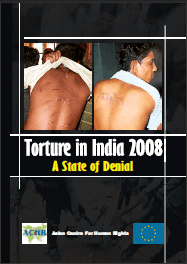
A State of Denial
 I recently stumbled on a report from the Asian Centre for Human Rights (ACHC), titled Torture in India 2008: A State of Denial. This document claims to be “the first nationwide assessment of the use of torture in India.”
I recently stumbled on a report from the Asian Centre for Human Rights (ACHC), titled Torture in India 2008: A State of Denial. This document claims to be “the first nationwide assessment of the use of torture in India.”
ACHC is a Delhi-based organization focused on protecting human rights throughout Asia, with what appears to be a specific focus on South Asia. I’m not familiar with this organization, so I’d be curious to hear if others can support or disprove their work.
The report focuses on the use of torture by police and security forces from routine arrests to counter-insurgency operations. Although it is clearly a preliminary analysis, it’s findings are quite alarming. The report notes:
The statistics of NHRC imply that in the last five years 7,468 persons at an average of 1,494 persons per year or four persons in a day died in police and prison custody in India. However, these figures represent only a fraction of the actual cases of torture. Cases of torture not resulting in death are not recorded.
Particularly troublesome was the section on custodial torture of women and children.
Some of you may be rolling your eyes thinking this is “just another Punjab Human Rights post.” However, the interesting thing in this 109 page report, is there is very little mention of Sikhs or Punjab. But the challenges facing the ACHC are very similar to what I’ve read in Ensaaf’s material about disappearances in Punjab – namely the dismissive nature by the Central Government, denying the there is a problem altogether:
The Home Minister attributes custodial deaths to “illness/natural death, escaping from custody, suicides, attacks by other criminals, riots, due to accidents and during treatment or hospitalisation”
Other similarities include the shortcomings of the National Human Rights Commission (NHRC) and it’s inability to deploy it’s powers toward investigating torture. The report also states:
NHRC’s preference for interim monetary compensation over recommending prosecution is a cause for further concern.
Sound familiar?
This report proves (yet again) that abuse of power by police and security forces are not an “aberration” or a result of isolated incidents – it is a systemic problem throughout India. And unfortunately, India’s failure to bring perpetrators of human rights violations to justice and overall poor human rights record does not seem to impact it’s relations with its allies.
To me, this report serves as a reminder that Sikhs are not alone in suffering human rights violations at the hands of the Indian State. Perhaps if we spoke with a collective voice, there could be a greater impact. After the Godhra pogrom in 2002, where nearly 1000 Muslims were massacred in Gujarat, a handful of Sikh Youth worked with the Gurdwara in Chicago to organize a “Rally Against Injustice In India” at Grant Park. Bus loads of people arrived from the local Gurdwaras and mosques all throughout Illinois and speakers from several religious communities addressed the crowd. The press coverage it received was far greater than previous protests done independently. Maybe something to consider as planning is in the works for the “25th anniversary” events…














This publish was very properly written, and it additionally accommodates many helpful facts. I loved your skilled manner of penning this post. You could have made it very easy for me to understand.